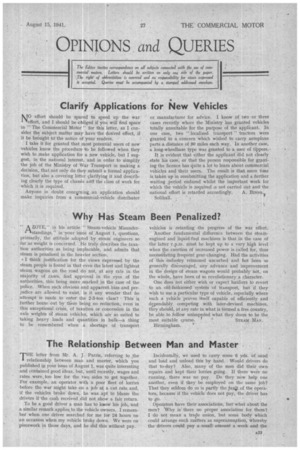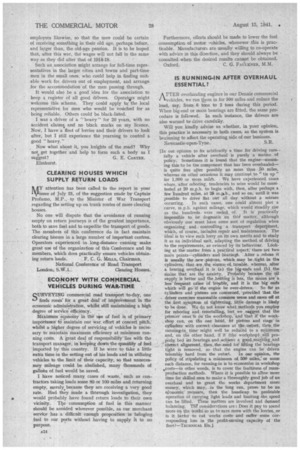The Relationship Between Man and Master
Page 25

Page 26

If you've noticed an error in this article please click here to report it so we can fix it.
'THE letter from Mr. A. J. Parris, referring to the I relationship , between man and master, which you published iu your issue of August 1, was quite interesting and contained good ideas, but; until recently, wages and rates were, too low for the two sides to get together. For example, an operator with a poor fleet of lorries before the war might take on a job at a cut rate and, if the vehicles broke down; he was apt to blame the drivers if the cash received did not show a fair return.
To be a good driver a man has to kraow his job, and a similar remark applies‘to the vehicle owners. I remember when one driver searched for me for 24 hours on an occasion when my vehicle broke down. We were on piecework in those days, and he did this without pay. IncidentallY, we used to carry some 6 yds. of sand and load and unload this by hand. Would drivers do that to-day? Also, many of the men did their own repairs and kept their lorries going. If there were no running, there was no pay. Do they nOw help one another, even if they be employed on the same job? That they seldom do so is partly the fat* of the operators, because if the vehicle does not pay, the driver has
to go.
Operators have their associations, but what about the men? 'Why is there no proper association for them? I do not mean a trap union, but some body which could arrange such matters as superannuation. Whereby the drivers could pay a, small amount a week and the
employers likewise, so that the men could be certain of receiving something in their old age, perhaps before, and larger than, the old-age pension. It is to be hoped that, after this war, the wages will not fall in the same way as they did after that of 1914-18.
Such an association might arrange for full-time representatives in the larger cities and towns and part-time men in the small ones, who could help in finding suitable work for drivers out of employment, and arrange for the accommodation of the men passing through.
It would also be a good idea for the association to keep a register of all good drivers. Operatys might welcome this scheme. They could apply tothe local representative for men who would be vouched for as being reliable._ Others could be black-listed.
I was a driver of a " heavy " for 20 years, with no accident claims, and no black marks on my licence. Now, I have a fleet of lorries and their drivers to look after, but I still experience the yearning to control a good "heavy."
Now what about it, you knights of the road? Why not get together and help to form such a body as I suggest? G. E. CARTER. Elmhurst.
CLEARING HOUSES WHICH SUPPLY RETURN LOADS
NAY attention has been called to the report in your iVissue of July 25, of the suggestion made by Captain Profumo, M.P., to the Minister of War Transport regarding the setting up on trunk routes of more clearing houses.
No one will dispute that the avoidance of running empty on return journeys is of the greatest importance, both to save fuel and to expedite the transport of goods. The members of this conference do in fact maintain clearing houses in a large number of important centres. Operators experienced in long-distance running make great use of the organization of this Conference and its members, which does practically ensure vehicles obtain ing return loads. F. C. G. Mu.r.,s, Chairman, National Conference of Road Transport
London, S.W.1.1 Clearing Houses.
ECONOMY WITH COMMERCIAL VEHICLES DURING WAR-TIME
SURVEYING commercial road transport to-day, one finds room' for a great deal of improvement in the economic administration, whilst still maintaining a high degree of service" efficiency.
Maximum econo' iny in the life of fuel is of primary
importance ti maintain our war effort at concert pitch; whilst a higher degree of servicing of vehicles is necessary to maintain maximum efficiency at minimum running costs. A great deal of responsibility" lies with the transport manager, in keeping down the quantity of fuel imported by this country. If he were to take a little extra time in the setting out of his loads and in utilizing vehicles to the limit of their capacity, so that unnecessary mileage could be abolished, many thousands of gallons of fuel would be saved.
I have noticed many cases of waste,' such as contractors taking loads some 80 or 100 miles and returning empty, merely because they are receiving a very good rate. Had they made a thorough investigation, they • would probably have found return loads to their own vicinity. The consumption of fuel in this manner should be avoided wherever possible, as our merchant service has a difficult enough proposition in bringing fuel to our ports without having to supply it to no purpose.
Furthermore, efforts should be made to lower the fuel consumption of motor ',chides, whenever this is practicable. Manufacturers are usually willing to co-operate with advice in this direction, and they should always be. consulted when the desired results cannot be obtained.
Oxford. C. G. FALIKNER, M.M.
IS RUNNING-IN AFTER OVERHAUL ESSENTIAL?
A FTER overhauling engines in our Dennis commercial Ivehicles, we run tbem in for 500 miles and reduce the load, say, from 6 tons to 2 tons during this period. When big-end or main bearings are fitted, the same procedure is followed. In each instance, the drivers are also warned todrive carefully.
will you kindly advise us whether, in your opinion, this practice is necessary in both cases, as the system is beginning to affect the operating side of our business.
Newcastle-upon-Tyne. S.R.
[In our. opinion to fix arbitrarily a time for driving care, fully a vehicle after overhaul is purely a matter of policy. Sometimes it is found that the engine—assuming this to be the component that has been overhauled— is quite free after possibly no more than ,50 miles, whereas on other occasions it may continue to " tie up" ior 1,000 or more miles. . We have experienced cases where, after reboring, tendencies to seize would be manifested at 20 m.p.h. to begin with, then, after perhaps a few hundred miles, at 24 m.p■h., and so on, until it was possible to drive flat out all day without 4 seizure occurring. In such cases, one could almost plot a curve, m.p.h. against mileage. which would steadily rise as thc hundreds were reeled of. It is practically impossible to be dogmatic on thisl matter, although obviously one must have some sort of regulation when organizing and controlling a transport department. which, of course, includes repair and Maintenance. The ideal is to view each lorry on its own merits and to study it as an individual unit, adapting the method of driving to the requirements, as evinced by its behaviour. Looking at the matter from a practical aspect, there are two main pointscylinders and bearings. After a rebore it is usually the new pistons, which may be tight in the cylinders, that .are , the sonrceof trouble, whereas, after a bearing overhaul it is (a) the big-ends and .(b) the mains that are the anxiety.because the oil supply is better and the ,heatig is less, the mains are a less frequent cause of 'trouble, and it is the big ends which will go if the engine be over-driven. So far as cylinders and pistons are concerned, provided that the driver exercises reasonable common sense and eases off at the first symptom of tightening, little damage is likely to be done. We do not know what methods you employ for reboring and remetalling, but we suggest that the premier onus -is On the workshop, and that if the workshop can, on the one hand, fit pistons and rings in cylinders with correct clearance at the outset, then. the running-in time might well be reduced to a minimum and, on the other hand, if it (the workshop) Will properly bed its bearings and .achieve a good marking and
" correct alignment, then the need lot' fitting the beatings tight is removed, so that the engine can be driven
tolerably hard from the outset. In our opinion, the policy of stipulating a minimum of 500 miles; or some such distance, for running-in is to economize in workshop icosts—in other words, is to cover the faultiness of massproduction methods. Where it is possible to allow more time for skilled men to make a thoroughly good job of an overhaul and to grant the works department more money, which may, in the long run, prove to be an eConomie' measure, then the handicap to profitable operation of carrying light loads and limiting the speed can he lifted. These Matters are involved and demand balancing. Tht considerations are: Does it pay to spend more on the works. so as to earn more with the lorries, or is it better to cut works costs and suffer some cOrresponding loss in the profit-earning capacity of the fleet ?—TECHNICAL ED.]
























































